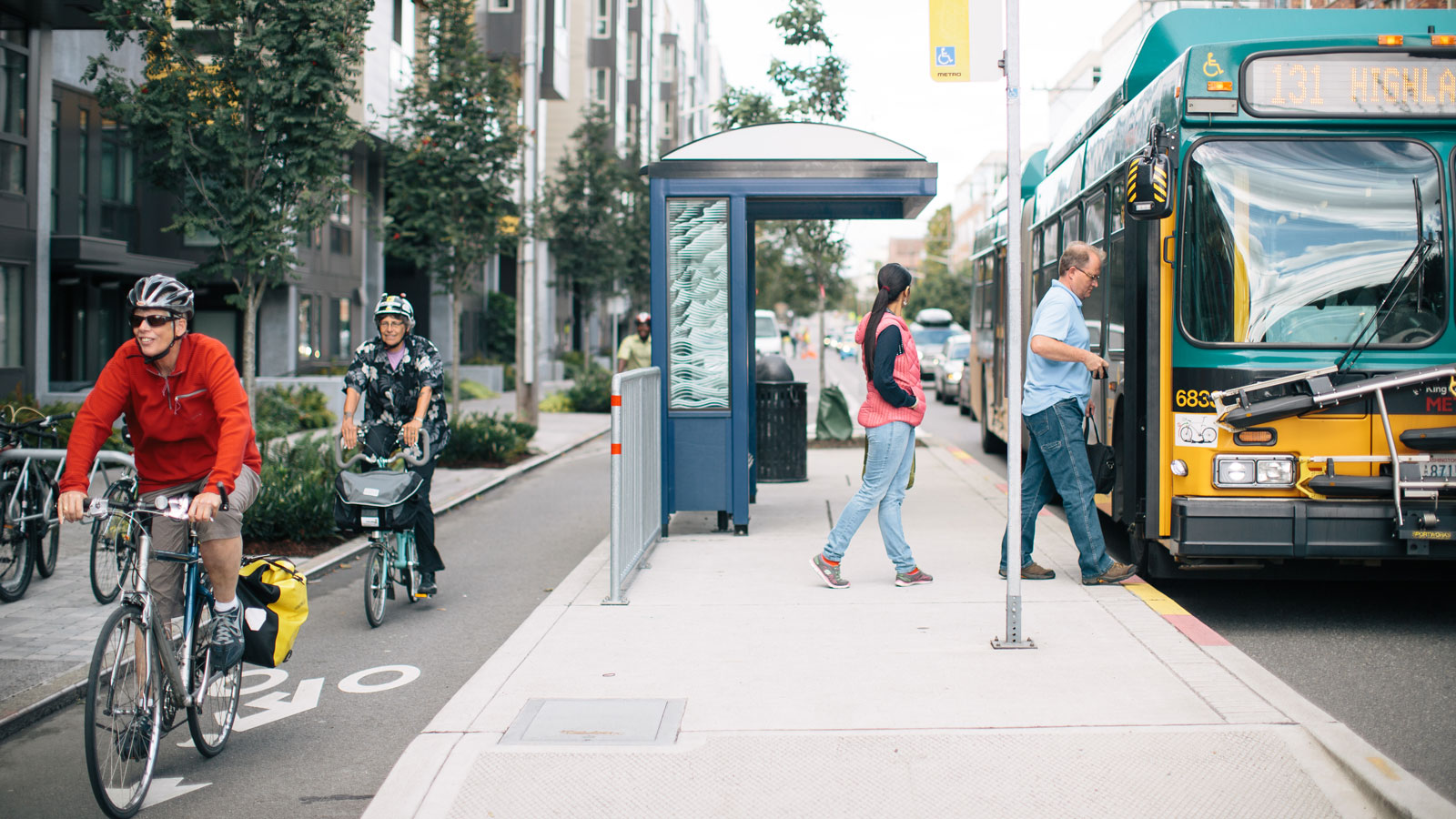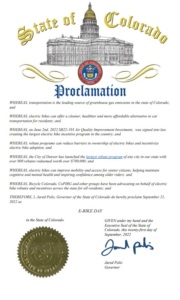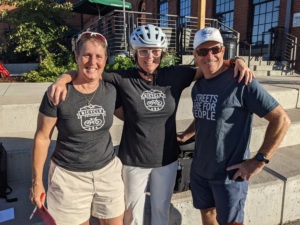
Tell our state leaders: It’s time to invest more in clean options for Colorado transit
As electric bikes become a more common sight on our streets, Colorado has emerged as a leader nationally in public funding for electric bike rebate programs. Public health advocate Alex Simon teamed up with bicycle experts from Bicycle Colorado to host a panel highlighting the impacts of electric bikes and the policies driving them forward.
Updated
SEND A MESSAGE
In 2021, electric bikes were the fastest growing segment of both the bicycle market and the electric vehicle market – a testament to the remarkable rise in popularity of this hybrid transportation option.
Electric bikes combine the flexibility, convenience, and health benefits of biking with the ease and ability to travel greater distances a motor provides.
With transportation as the number one source of greenhouse gas emissions in Colorado, finding practical alternatives to individual car trips is paramount in reducing the state’s worsening air pollution. Electric bicycles produce zero emissions and are an increasingly important tool in reducing emissions from the transportation sector.
In the spring, Colorado passed SB22-193, a package of air quality initiatives that included $12 million in public funding for electric bike rebate programs. The bill made Colorado the national leader in public funding for e-bikes. The state was already off to a strong start with Denver’s wildly popular rebate program.

Governor Jared Polis declares September 21, 2022 to be Colorado E-Bike Day’, thanks to work from CoPIRGPhoto by Alexandra Simon | Used by permission
Nearly 50% of trips in the Denver metro region are less than three miles, a distance that can be easily covered with an e-bike, reducing car traffic and pollution.
Recognizing the importance and momentum of e-bikes in Colorado, we worked with the Governor’s office to have September 21, 2022 officially declared ‘Colorado E-Bike Day’.
View Colorado E-Bike Proclamation
To celebrate our progress and look to the future, I worked with Bicycle Colorado to host an event with panelists from the Colorado Energy Office, City of Denver’s Office of Climate Action, Sustainability, and Resiliency, People for Bikes, and an individual rebate recipient to discuss how electric bikes are changing the transportation landscape.
Here are a few highlights:
Bicycle Colorado’s Sustainable Transportation Director Rachel Hultin spoke about the multiple positive impacts they can have on both riders and the environment by replacing car trips, especially by increasing accessibility for many riders who may have physical limitations or impediments to riding a regular bike.
E-bikes are the future - they're here and on the rise. Colorado leads the nation in e-bike funding because we're committed to combating GHG emissions by replacing car trips with bike rides, while also working to provide affordable alternatives to car ownership. Every person you see on an e-bike is someone who is enjoying being a solution to some of our biggest problems.Rachel Hultin
Bicycle Colorado Sustainable Transportation Director

John Simmerman from Active Towns joins up with Piep Van Heuven and Rachel Hultin from Bicycle Colorado to talk to e-bike riders in the Denver area.Photo by Piep Van Heuven | Used by permission
Active lifestyle podcaster and content creator John Simmerman brought his Active Towns podcast to Denver, and I joined him to talk to people in the Denver area who are riding electric bikes.
We learned about which bikes people are riding, where they go, how they use their bikes, what made them buy an electric bike in the first place, and how they feel about the investments made by the state and city.
Active Towns’ host John Simmerman, Piep Van Heuven and Rachel Hultin from Bicycle Colorado, and Alex Simon from CoPIRG team up to interview 9 different electric bike riders in Colorado.
People For Bike’s Electric Bicycle Policy and Campaign Director Dr. Ash Lovell provided insight on trends and policies happening on the national level, highlighting how electric bikes are now the top selling category of all electric vehicles, outpacing all electric cars.
While the cost of an electric bike may seem high compared to a traditional bicycle, using electric bikes to replace car trips helps reframe the expense – after all, the cost of an electric bike is significantly less than a new electric vehicle.
Because electric bikes can make longer trips – including carrying cargo – more easily, they are well suited to be a replacement transportation option to a car.
Electric bicycles have been proven to help folks ride bicycles more often and for longer trips - making them an essential tool in mode shifting away from cars and toward human-powered mobility. We're looking forward to helping more folks transition their car trips to bike trips using their electric bicycle.Dr. Ash Lovell
Electric Bicycle Policy and Campaign Director, People for Bikes
According to Ash, a recent study showed that maximizing electric bicycle use could save a total of 24.4 million metric tons of carbon dioxide emissions per year with an average savings of 580 kilograms per person.
Nationally, one aspect of electric bikes gaining traction is using them to decongest urban centers. People for Bikes has partnered with the Urban Freight Lab from the University of Washington to further explore the applications of commercial electric cargo, improving both traffic and air quality.
Ash and her team are also looking at how e-bikes can be used to decongest trailheads – a welcome solution to an increasingly common problem in Colorado, especially along the Front Range. They are working with federal partners to explore how electric bikes of all kinds can be used to help move people to and from these popular places.
Government Relations Director Piep van Heuven from Bicycle Colorado touched on the success of previous state programs and investments in growing the number of bikers in the state.
Following the launch of one of the biggest bike sharing programs in the country, she saw that biking for transportation gained popularity in Denver. And following the installation of the city’s first protected bike lane along 15th Street in 2015, more people began cycling, especially women.
The pandemic fueled a worldwide bike boom, brought about by quieter streets and needed mental and physical health benefits.
Bicycle Colorado worked directly with the Colorado Energy Office to help launch a 2020 mini pilot e-bike program in an effort to support local community recovery during the pandemic. They engaged a community partner, Northeast Transportation Connections, with a track record of doing work within the community around biking and mobility. Participants in that pilot received a free e-bike and other essentials, including a lock, helmet, panniers, and voucher for bike maintenance. National Renewable Energy Laboratory (NREL) contributed to the project by installing a GPS tracking system on the bikes and analyzing the data to determine the number of car trips replaced.
Piep shared the initial results from that e-bike pilot program:
They found all the participants were using the bikes, and replacing single-occupancy car trips by about 35% during the measurement time period. So we knew from that moment that we had found a good thing, and from there Will [Director of the Colorado Energy Office] and his team really got to work to develop how this could work at a statewide level.Piep van Heuven
Government Relations Director, Bicycle Colorado
Household motor vehicle trips are one of the biggest drivers of transportation emissions in the country, and data from the U.S. Office of Efficiency and Renewable Energy showed that in 2017 nearly 60% of these trips are a distance of 6 miles or less, the perfect distance for an e-bike trip.
Colorado Energy Office (CEO) Director Will Toor shared how the seeds for the nation’s largest public investment in electric bikes stemmed from concern over cuts to public transportation during the pandemic, especially for low-income workers who rely on it to get to work.
In 2020, together with the Department of Environment Health, and Department of Transportation, CEO launched the state’s first pilot program alongside a Main Streets program to help repurpose street space in downtown areas to be more bike and pedestrian friendly.
What we immediately saw once we started the program was how much people love e-bikes… we work on a lot of different issues, but nothing else we’ve worked on has gotten as much instant and positive community reaction as e-bikes, and I realized we could do something on a much larger scale.Will Toor
Director, Colorado Energy Office
Both programs have been expanded since then, and the state added $12 million in public funding for electric bike rebates in an air quality package bill passed earlier this year.
Director Toor also spoke about Colorado’s Community Access Enterprise (CAE) program, which strives to increase low-income residents’ access to electric vehicles and charging infrastructure. By classifying an electric bike as an electric vehicle, the state can use funds from the CAE program to create a long-term and growing funding source for e-bike programs serving low-income residents.
CEO is currently in the process of designing the state program, which they expect to launch in early 2023.
Elizabeth Babcock, Deputy Director of Denver’s Office of Climate Action, Sustainability, and Resiliency (CASR) spoke about the need for community engagement and equitable funding strategies for success at the local level, as demonstrated by Denver’s incredibly popular e-bike rebate program.
The Denver rebate offers $400 off electric bikes and $900 off electric cargo bikes, increasing to $1200 for e-bike rebates and $1700 for e-cargo bike rebates for income qualified residents. Initially funded with $250,000, the program has expanded to give out over $4 million in rebates to more than 4,000 participants and counting in 2022, with new rounds for applications selling out within minutes.
Liz cites the community engagement around the 2020 Climate Action Task Force, resulting in the Climate Protection Fund (CPF), as key to the program’s successful launch.
Because electric bikes can replace vehicle trips while meeting many different needs, launching an e-bike rebate was an early action item for the fund. To align with the CPF’s equity mandate, the program was designed to be as inclusive and equitable as possible. More than half of the funding is reserved for income qualified residents and the upfront rebate further reduces the financial burden for participants.
Listen to the community first, listen to what their needs are - do that exploration with your community to understand what their priorities are - and then figure out a way that you can equitably fund that work.Elizabeth Babcock
Deputy Director, Denver’s Office of Climate Action, Sustainability, and Resiliency
The program works with local bike shops to participate in the rebate, an effort not only to get people more comfortable trying electric bikes but also to foster a local economy around e-bike service and repairs.
CASR has plans to continue to make the program even more accessible and user-friendly as it continues into 2023.
Darnell Robinson, CAN DO Colorado Mini Pilot Bike Program Recipient spoke about his experience participating in the 2020 state CAN DO pilot program to transition to an electric bike as his primary means of transportation to and from his job.
He found out about the program through a friend – a testament to the power of word of mouth for early program adoption – and since he was already riding a regular bicycle he was interested in trying an electric bike. In exchange for recording and sharing data from his e-bike with the state, he was given the e-bike for free.
Darnell touted the many benefits the electric bike brought as he biked to and from his jobs, one of which was four miles away:
I had a great experience riding back and forth from work, and not feeling tired, being self-motivated to go further. After work I had energy, so it definitely boosted my motivation. If we continue on with the rebate program, I have other friends that would be into it.Darnell Robinson
CAN DO Colorado Mini Pilot Bike Program Recipient
He noted that the word on e-bikes is getting out, and that some friends had tried them out through a local bicycle library.
The bikes can be an ideal fit for people without access to a car and facing commutes that are too far to walk or not well served by public transportation. Even with access to a car, the bike can be a faster and more affordable alternative.
“To consider getting an e-bike, I would consider the travel that you need to go through vs. getting there with a vehicle. If you can get there just as easily on the bike with a bike lane, I would take that route,” said Darnell.
With Colorado leading the way on e-bikes, there has never been a better time for you to get into the game.

Kids riding on the back of electric cargo bikes are becoming a common sight at schools in the Denver area.Photo by Alexandra Simon | Used by permission
E-bikes can improve air quality and provide a healthier alternative to individual car trips. Tell your state representative to continue funding.
Take Action
Alex is an advocate on Colorado-based campaigns to promote a healthier, cleaner and safer world. She previously served as the Director of Strategic Planning for The Public Interest Network. Alex lives in Denver, where she enjoys hiking, skiing and seeing live music.